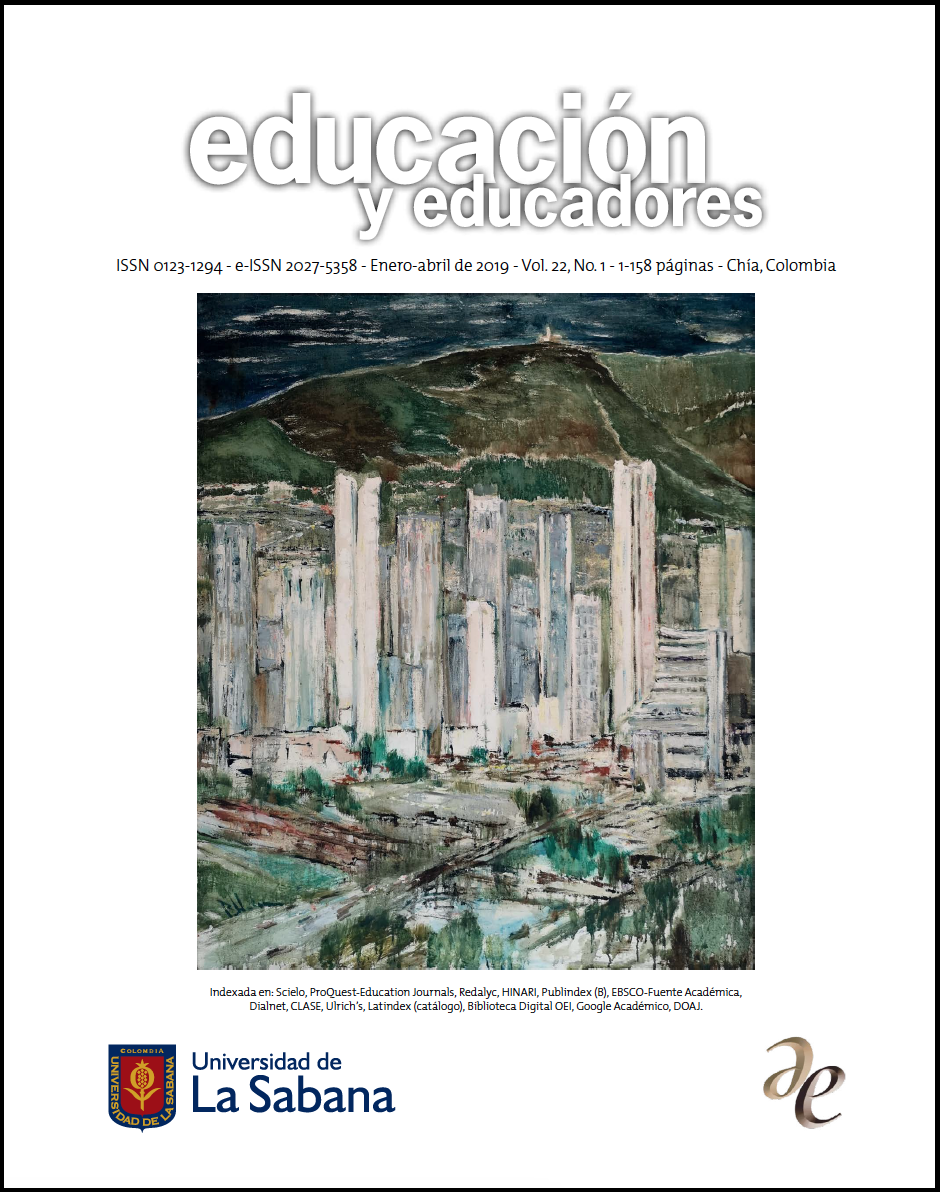Posibilidad de acuerdos sobre las concepciones de currículo para la formación de maestros
DOI:
https://doi.org/10.5294/edu.2019.22.1.1Keywords:
Programme of study, curriculum, higher education, educational personnel training, curriculum research, educational programmesAbstract
Possible Agreements on Curriculum Conceptions for Teacher Training
Acordos possíveis sobre concepções de currículo para a formação de professores
Curricula continue to be a matter of research and problematization in higher education programs, particularly those that train teachers. Although the tendency is to consider them from an instrumental and technical perspective, this paper adopts critical and comprehensive perspectives. Then, this qualitative case study carried out in a School of Education at a public university intends to inquire into the curriculum conceptions present in teacher training programs and their characteristics. The research focuses on the different ways of conceiving the curriculum in the programs, even when they are part of the same academic unit; on flexibility and curricular integration as central concerns; and on the shaping/structuring of programs, which is not homogeneous but determines some paths in the training of those participating in the proposals. From the discussion, it is concluded that a key implication is the need to reach agreements both on curriculum conceptions that guide teaching action and practice and on the particular ways in which proposals are structured/shaped, following those “common minimums” that enable dialogue and collective construction.
Para citar este artículo / To reference this article / Para citar este artigo
Giraldo, E., Cadavid, A. M. y Flórez, S. (2019). Posibilidad de acuerdos sobre las concepciones de currículo para la formación de maestros. Educación y Educadores 22(1), 9-22. DOI: 10.5294/edu.2019.22.1.1
Recibido: 13/05/2019
Aprobado: 23/04/2019
Downloads
References
Bloom, L. R. (1998). Under the sign of hope: Feminist methodology and narrative interpretation. Albany, NY: SUNY Press.
Bogdan, R. C. y Biklen, S. K. (2003). Qualitative research for education: An introduction to theories and methods (4 ed.). Boston: Allyn and Bacon.
Bogdan, R. C. y Biklen, S. K. (2007). Qualitative research for education: An introduction to theories and methods (5 ed.). Boston: Pearson Allyn and Bacon.
Cherryholmes, C. H. (2002). Curriculum ghosts and visions—and what to do? En W. E. Doll Jr. y N. Gough (eds.), Curriculum visions (pp. 116-126). Nueva York: Peter Lang.
Díaz, M. (2002). Flexibilidad y educación superior en Colombia. Bogotá: Icfes.
Doll Jr., W. E. (1993). Curriculum possibilities in a “post”-future. Journal of Curriculum and Supervision, 8(4), 277-292. Recuperado de http://www.ascd.org/publications/jcs/summer1993/Curriculum_Possibilities_in_a_%E2%80%9CPost%E2%80%9D-Future.aspx
Doll Jr, W. E. (2002). Ghosts and the curriculum. En W. E. Doll Jr. y N. Gough (eds.), Curriculum visions (pp. 23-70). Nueva York: Peter Lang.
Giroux, H. A. (1991). Modernism, postmodernism, and feminism: Rethinking the boundaries of educational discourse. En H. A. Giroux (ed.), Postmodernism, feminism, and cultural politics: Redrawing educational boundaries (pp. 1-59). Albany, NY: SUNY Press.
Goodson, I. F. (2003). Estudio del currículo: Casos y métodos. Buenos Aires: Amorrortu.
Hernández, M. L. y Tovar, T. (2009). Estudio comparativo de los enfoques curriculares utilizados para la formación de licenciados y profesionales de la Educación Física en Bogotá: Su pertinencia e impacto. Revista Educación Física y Deporte, 28(2), 60-77. Recuperado de http://aprendeenlinea.udea.edu.co/revistas/index.php/educacionfisicaydeporte/article/view/3070
Hwu, W. (2004). Gilles Deleuze and Jacques Daignault: Understanding curriculum as difference and sense. En W. M. Reynolds y J. A. Webber (eds.), Expanding curriculum theory: Dis/positions and lines of flight (pp. 181-202). Mahwah, NJ: LEA.
Lather, P. (1991). Getting smart: Feminist research and pedagogy with/in the postmodern. Nueva York: Routledge.
Mager, R. (1962). Preparing instructional objectives. Palo Alto, CA: Fearon.
Miller, J. L. (1993). Constructions of curriculum and gender. En S. K. Biklen y D. Pollard (eds.), Gender and education (pp. 43-63). Chicago: University of Chicago Press.
Patton, M. Q. (2015). Qualitative research and evaluation methods. Thousand Oaks, CA: Sage.
Phelan, A. M. (2011). Towards a complicated conversation: Teacher education and the curriculum turn. Pedagogy, Culture & Society, 19(2), 207-220. DOI: 10.1080/14681366.2011.582257
Pinar, W., Reynolds, W., Slattery, P. y Taubman, P. (2004). Understanding curriculum: An introduction to the study of historical and contemporary curriculum discourses. Nueva York: Peter Lang.
Pineau, E. L. (2005). Teaching is performance: Reconceptualizing a problematic metaphor. En B. K. Alexander, G. L. Anderson y B. P. Gallegos (eds.), Performance theories in education (15-39). Mahwah, NJ: Lawrence Erlbaum Associates.
Ruiz, J. M., Barreto, G. y Blanco, R. (2007). Flexibilidad en planes de estudio Universitario. Pedagogía y Saberes, 26, 9-17. DOI: 10.17227/01212494.26pys9.17
Tyler, R. (1969). Basic principles of curriculum and instruction. Chicago: UC Press.
Universidad del Valle (2008). El proyecto formativo: Sistematización del proceso de configuración de la política curricular en la Universidad del Valle 1986-2005. Cali: Universidad del Valle.
Published
How to Cite
Issue
Section
License
1. Proposed Policy for Journals That Offer Open Access
Authors who publish with this journal agree to the following terms:
-
This journal and its papers are published with the Creative Commons License CC BY 4.0 DEED Atribución 4.0 Internacional. You are free to share copy and redistribute the material in any medium or format if you: give appropriate credit, provide a link to the license, and indicate if changes were made; don’t use our material for commercial purposes; don’t remix, transform, or build upon the material.










